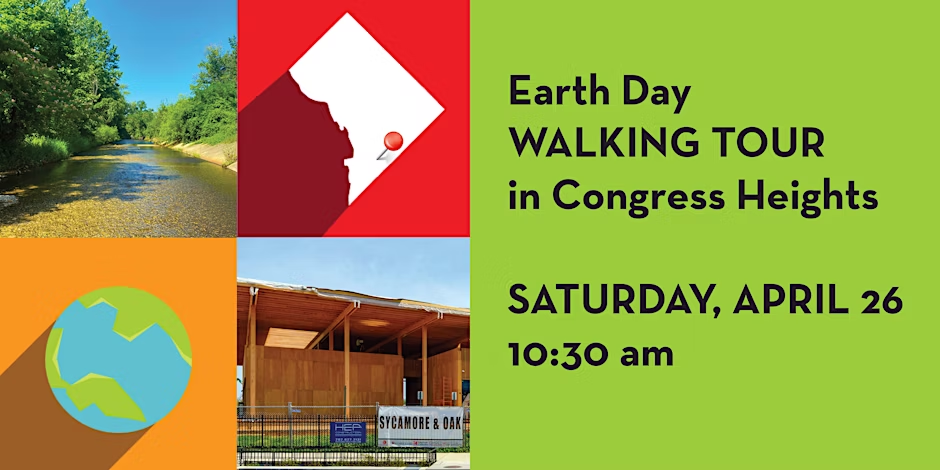Join the Department of Energy and Environment for an Earth Day-themed walking tour in the Congress Heights neighborhood.
By registering for this event you agree to follow WABA's Code of Conduct.

Saturday, April 26, 2025 - 10:30am
Congress Heights Station
Hosted by DOEE
Join the Department of Energy and Environment for an Earth Day-themed walking tour in the Congress Heights neighborhood.
By registering for this event you agree to follow WABA's Code of Conduct.
Bike lanes are most effective when they connects to other bike lanes, protected bike lanes, even more so.
WABA works with teams of grassroots volunteers across the District to demand a network of low-stress places to bike. A network where you, your kids, nephews, nieces, or grandkids, can all get where you need to go safely, easily, happily on bikes.
Check out upcoming events in DC’s Wards 7 and 8 that celebrate outdoor resources and opportunities to active! Get involved with upcoming projects to help you get around by walking, biking, or taking transit. Explore a park, trail, or neighborhood, including Anacostia Park and the Anacostia Riverwalk Trail, Oxon Run Park and Trail, Marvin Gaye Trail, and more!
Complete Streets are streets designed to accommodate all users, and that prioritize historically underinvested modes of transportation like transit, walking, and biking. An incomplete street might lack adequate sidewalks, low-stress bike infrastructure, or safe and comfortable access to transit.
Effective Complete Streets policies change the way a jurisdiction plans and builds transportation infrastructure—sidewalks, low stress bike infrastructure, and transit should be included in any new or rebuilt street by default, rather than as an add-on when there's space or demand.
While most regional jurisdictions have a Complete Streets policy of some sort, they lack teeth and permit transportation departments to continue to build streets that put cars first and squeeze other modes into the margins.
Done right, Vision Zero is a transformative approach to traffic safety and transportation planning. Developed in Sweden, it is built on two core principles: crashes are preventable, and the only acceptable number of deaths from traffic violence is Zero. It provides a clear framework for decision-making that prioritizes safety for everyone over speed and convenience for drivers.
DC launched a Vision Zero initiative in 2015, with surrounding jurisdictions following suit over the next few years.
While there have been laudable projects launched under the Vision Zero banner across the region, the adoption of Vision Zero programs have not been the transformational shift required to reverse the increase in deadly traffic violence.
WABA's Vision Zero advocacy focuses on using legislation and policy to permanently change they way decisions are made: requiring that transportation planning and engineering put safety over driver convenience in every decision.
WABA runs a variety of outreach programs that create opportunities for people across the region to join the bicycling community.
WABA fights for a region where biking, walking and transit are the best ways to get around.
We educate policymakers and organize grassroots advocates for to speak up for safer places to bike and walk; and for laws and policies that protect people who are walking and biking, reduce dangerous driving, and facilitate changes to the built environment.